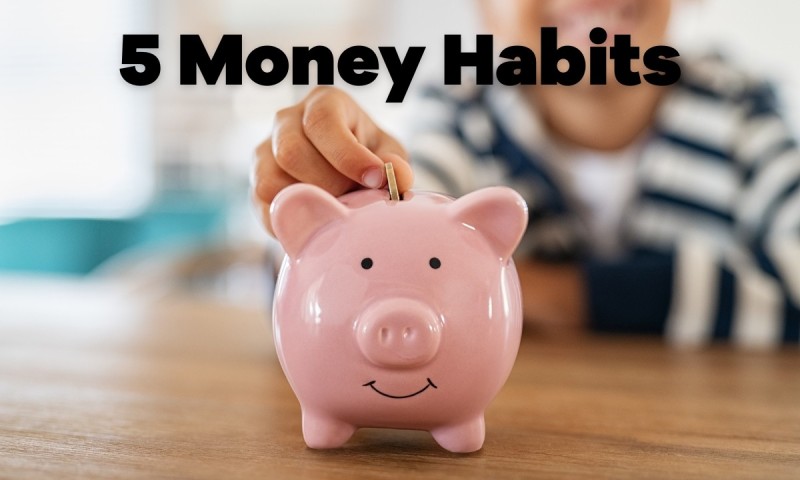5 Simple Money Habits That Could Change Your Life

When money’s tight, it’s tempting to think you need fancy tools or paid courses to get back on track. You don’t.
These five simple habits cost you nothing to start, but they make a massive difference to your bank balance and stress levels — especially during a financial wobble.
Read what helps, skip what maybe doesn’t, and begin afresh today.
1) The seven-minute check-in
Every evening, spend seven minutes looking at your accounts. That’s all you need.
Scan yesterday’s spending, and move any tiny leftovers to savings (even less than £1), and take a glance at upcoming bills. This tiny ritual keeps surprises to a minimum and stops shame from building up.
How to start:
- Open your banking app after brushing your teeth.
- Log yesterday’s spends in a simple note on your phone.
- Set one intention for tomorrow (e.g., “no takeaway”, “pack lunch”).
Seven minutes is short enough to do on your worst day, but powerful enough to change your month.
2) Audit every bill
Once a quarter, you can do a financial audit. Check your energy, broadband, mobile, insurance, and streaming contracts — anything that renews.
Then, cancel any that you don’t truly use, and call around or use a comparison site to find a better deal or a cheaper plan. You don’t need to be pushy, as a polite “I’m reviewing my budget — what’s the most cost-effective option you can offer?” often works wonders.
How to start:
- List all direct debits and subscriptions.
- Set reminders for renewal dates.
- Trim one thing, if possible (a duplicate streaming service, cloud storage you don’t use, that “free trial” you forgot).
If you’re struggling to keep up payments, tell providers early — many have hardship teams and payment plans. Asking for help is free and often fast.

3) Master the food Shop
Food is where most of us leak money, so a good rule to stick to is: plan before you pay.
Check the fridge and cupboards, plan five simple meals around what you already have in, and write a short list. And only shop once, not five times.
However, you can use “cook once, eat twice” meals — chilli, soup, pasta — and I portion leftovers for tomorrow’s lunch.
How to start:
- Do a 10-minute cupboard inventory.
- Plan five meals using what’s already there.
- Shop with a list and eat before you go.
- Search through for freebies or big discounts on any cashback apps you might use.
- Use your supermarket’s free loyalty card, if it saves money on what you’d buy anyway.
A calm, planned shop beats a hungry, random one every single time.
4) The 48-hour rule for non-essentials
Impulse buys can torch your budget if you have one — so stick to your list and budget by letting it sit.
Anything non-essential should sit in a 48-hour “cooling-off” list. If you still want it after two sleeps — and it fits your plan — find the best price. You’ll notice though, that most things quietly fall off the list.
How to start:
- Create a note called “48-Hour List”.
- Unsubscribe from marketing emails and mute shopping apps.
- Remove saved cards from browsers so buying takes effort.
This habit gives you a pause button when your feelings want a fast one.
5) Free Before Fee
One final habit: look for any free versions first. If you need a book, go to the library. If you need tools, try to borrow or swap from friends or family.
If you’re craving a night out, check local events, community classes and check on the local Facebook pages.
Before you buy, ask yourself: can I borrow it, find it second-hand, get a free sample, or go without? Most of the time, the itch will pass.
How to start:
- Join a local “buy-nothing” or community swap group.
- Search for free trials and samples (set a reminder to cancel).
- Ask friends if they’ve got the thing you need—most people love to help.
Pair this with a quick sale of something you don’t use—free cash, clearer space.
A quick word if you’re in crisis
Prioritise the essentials first, like housing costs, council tax, energy bills, and food. These are the most important and things that you cannot live without.
Contact any creditors and providers early — explain your situation and ask about repayment plans or support schemes. Check what you might be entitled to through benefits calculators and local grants. None of this costs you anything, and it can buy you breathing space.
Essentially, you don’t need perfect spreadsheets or an iron will. You need tiny, repeatable actions: a seven-minute check-in, a quarterly audit, planned food shops, a 48-hour pause, and a “free before fee” mindset. Start one today. Your future self will thank you—and so will your bank balance.

